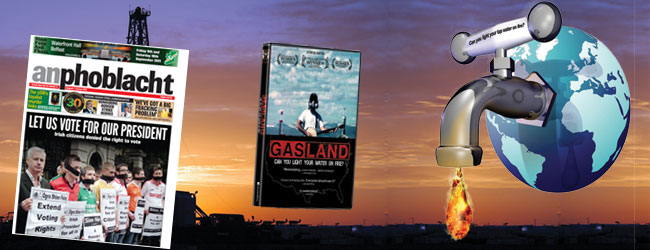18 August 2011
‘WE’VE GOT A BIG FRACKING PROBLEM’ – Controversial gas exploration technique causes concern in north-west Ireland
A NEW gas extraction method, hydraulic fracturing or ‘fracking’, as it’s commonly called, could allow the exploitation of huge gas reserves in Ireland’s north-west but the controversial method could have major environmental impacts. MARK MOLONEY reports.
ON 1st April this year, a small earthquake measuring 2.2 on the Richter Scale struck the seaside resort of Blackpool in the north of England, less than 50 miles from the Sellafield nuclear power plant. Another slightly more powerful quake occurred in the same region less than two months later. While neither of the quakes caused any structural damage they had major implications for Britain’s energy policy. The British Geological Survey Group claimed that the two events were related to fracking that was taking place at nearby Preese Hall on the Fylde Coast.
Fracking involves the injection of millions of gallons of water and sand mixed with rock-dissolving chemicals at high-pressure into gas-bearing rock deep below the earth’s surface to release trapped gas by causing the rock and shale to crack and fracture.
Commenting on the Blackpool earthquakes, the British Geological Survey Group said:
“Any process that injects pressurised water into rocks at depth will cause the rock to fracture and possibly produce earthquakes.
“It is well-known that injection of water or other fluids during oil extraction and geothermal engineering, such as shale gas, processes can result in earthquake activity. Typically, the earthquakes are too small to be felt; however, there are a number of examples of larger earthquakes occurring.”
Following the incident, the mining company Cuadrilla Resources suspended operations in the area.
Such incidents have worried residents of the north-west of Ireland.
Earlier this year, the Irish Government granted onshore exploration licenses to two companies in order to allow them to search for oil and gas in the Lough Allen basin, which consists of parts of the counties of Cavan, Fermanagh, Leitrim, Sligo, Donegal and Roscommon. According to experts, there could be as much as €85million worth of gas in the area – but the only way to extract these massive deposits would be through the use of hydraulic fracturing.
The possibility of earthquakes is not the only thing that has residents worried.
Fracking was outlawed in France, parts of South Africa, Quebec, New York and Pennsylvania following concerns over the effect the extraction method was having on supplies of drinking water. Thousands of incidents of groundwater contamination in the United States were recorded in areas where fracking was taking place. Many locals claimed to have suffered from serious illnesses after drinking their tap water while in some areas water was so heavily contaminated by poisonous gas and chemicals that residents actually filmed themselves setting water from their taps on fire.
The furore surrounding such incidents was documented by the award winning film ‘Gasland’ which has recently enjoyed public screenings in Ireland. Two weeks ago, the film was screened in the Cavan border village of Blacklion. The showing was welcomed by Sinn Féin MLA for Fermanagh and South Tyrone Phil Flanagan, who said that the screening would inform local residents of the potential environmental impact of the controversial extraction technique.
“No amount of words could put across the dangers as coherently as being able to see people set their own tap water on fire due to contamination from natural gas and toxic chemicals or listen to the horror tales that many families had to live through,” he said.
Sinn Féin TD for Sligo & North-Leitrim Michael Colreavy also organised a screeing of the documentary in Leinster House. He said:
“Sinn Féin is not opposed to exploiting our natural resources for the benefit of the people but there must be a radical change to the entire exploration sector.”
Paul Cassidy, a member of the Tydavnet Group Water Scheme and also a representative of the group ‘No Fracking Ireland’ (NFI), told An Phoblacht:
“The North-West Carboniferous Basin contains the sources of the Shannon, the Erne and Blackwater/Lough Neagh systems, the Shannon being the largest river in Ireland and Lough Neagh being the largest lake. To introduce such a controversial industry into this region –– of all places on the island –– seems almost like an intentional act of sabotage.
“It is simply unthinkable that any Irish government would consider extending licences in the north-west region.”
He added:
“Sinn Féin are very well placed to play a key role in banning hydro-fracking in Ireland.”
Meanwhile, Seán Wynn of the Lough Allen Conservation Association claimed that local residents are being kept in the dark about the plans for the area. He called on those who proposed the scheme to come forward and explain the potential impact that the development could have on the local area.
“There’s no ‘free lunches’ and if you are carrying out exploration and drilling for gas and oil then obviously there is an impact on the environment. It’s a little suspect that the whole thing hasn’t come out into the public domain.”
Follow us on Facebook
An Phoblacht on Twitter
Uncomfortable Conversations

An initiative for dialogue
for reconciliation
— — — — — — —
Contributions from key figures in the churches, academia and wider civic society as well as senior republican figures





